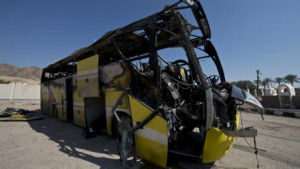
As the elections for a new head of the state are approaching, and given the conditions when the military decided to nominate their own candidate, Field Marshal Sisi, who is now the interim military ruler of the ARE, the heat of the struggle is increasing. A few days ago, there was a qualitative change in the Egyptian crisis, since the radical Islamists changed their tactics of fighting against the authorities, and switched from attacks on civilian and military targets to foreign tourists. Blowing up of the tourist bus in Taba on February 16, and fighters’ threats to attack foreign tourists in Egypt, show that they have chosen the most vulnerable targets. Attacks on tourists could undermine the fragile economy of the country, which is suffering from political turmoil.
As it is known, on February 16, a bus with Christian tourists from South Korea, who were making a pilgrimage tour to churches in Cairo and St. Catherine’s Monastery, was blown up in the resort town of Taba, a few hundred meters away from the Israeli border. Three South Korean tourists died, the fourth victim was the Egyptian driver, and 13 people were injured. The terrorist act was carried out by a 21-year-old Egyptian, who fixed a “suicide belt” onto his body. The responsibility for the first raid against foreigners since Islamists were removed from power in Egypt in July last year was taken over by the extremist group Ansar al-Maqdis Beit, which is operating in the Sinai, and whose militants are behind the majority of terrorist attacks, recently carried out in the country. On February 18, the extremists made an ultimatum-like announcement on the Internet advising all foreign tourists to leave Egypt and threatening to attack any foreigners, staying in the country after February 20.
Unrest in Egypt can affect the tourism business. Egypt’s tourism industry revenues have already dropped tremendously over the last year. In 2013, they amounted to only $5.9 billion, which is the lowest result for the last three years. In 2010, before the unrest, tourism brought the country $12.6 billion. The tourism industry of Egypt accounted for 12.5% of total employment and 11.3% of GDP. Hotels in popular tourist cities are almost empty: occupancy rate of hotels in Luxor was 1%, and 0% in Aswan; in the Red Sea resorts the occupancy rate was 10–20%, said Egyptian Tourism Minister Hashim Zaazou. According to him, 165 hotels were temporarily closed in July and August due to lack of customers. Back in early February, he predicted that the number of foreign tourists in Egypt in 2014 would be 12.5 million, against 9.5 million in 2013.
At the same time, according to the Federal Tourism Agency, Egypt is among the three most popular tourist destinations among Russian tourists. For the first nine months of 2013, Egypt was visited by 1.4 million Russians, in 2012 – by 1.9 million. At present, about 50,000 Russians are having a rest in Egypt, and as we are approaching the warm season, their number may increase to 70–80 thousand by May.
After the overthrow of the Egyptian President Mohamed Morsi in July 2013, a representative of the Islamist organization Muslim Brotherhood, hundreds of police officers and soldiers were killed by the militants. The grouping, threatening the tourists now, claimed responsibility for the bombings of the buildings of the security forces in Cairo and Mansoura.
“The threats of al-Maqdis Beit against tourists pose new challenges to the Egyptian security service and the state, as a whole,” the press secretary of the Ministry of Internal Affairs Ahmed Hani Abdel Latif said on February 18. Resort areas have always been well protected, but now additional security measures have been introduced in these areas – we increased the number of checkpoints and the number of officers, checking the transport entering the territory of the resort.
The problem is in the fact that the terrorist groups, operating on the Sinai Peninsula are very mobile, they have numerous weapons caches and move quite freely in the wilderness. In recent months, they carried out very sensitive strikes against military targets of North Sinai, subjecting to attacks checkpoints and road convoys of the Egyptian army. Several senior officers were killed. In addition, terrorists have repeatedly bombed the pipeline that transports Egyptian gas to Jordan and Israel.
Egypt’s intelligence services have a rather poor control over the situation of the extremist underground in the Sinai, where Islamists have the support of the local population, especially of the Bedouin tribes. At the same time, there has been noticed a steady upward trend in the terrorist activity there. Experts estimate that the extremists can easily access all the locations of the peninsula. So far, only Sharm el-Sheikh and Dahab have not been attacked by the Islamists, but no one can guarantee that the attacks will not occur there also. Moreover, according to Western analysts, if another similar attack against tourists happens in Egypt, the country will, for a long time, lose its attractiveness for tourists from Europe and America.
Unfortunately, we must admit that the change of Mubarak’s regime 3 years ago, which happened as a result of the “Arab Spring”, funded by Saudi Arabia and Qatar, plunged this largest country of the Arab world into a long period of chaos. The military coup did not lead to stabilization. The Muslim Brotherhood continues to be the dominant force in Egypt. In addition, the current confrontation will continue to immerse Egypt into the abyss of political and economic crisis, and no bailouts will help it. Money will be simply wasted. Egypt has all the chances to continue sliding into a situation of a “failed state”.
Alexander Orlov, political scientist, expert in Oriental Studies, exclusively for the online magazine New Eastern Outlook.
